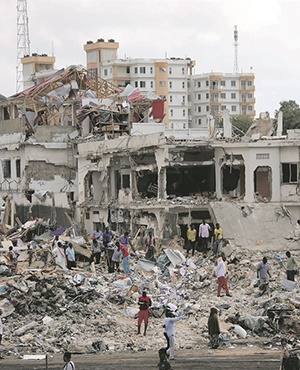
City Press | | 2017-10-22 06:07 | by Alexis Okeowo – Over the weekend, a massive truck bomb exploded in Mogadishu, the sprawling, once-lovely capital of Somalia.
The explosives went off on a Saturday afternoon, in a busy intersection during a traffic jam.
An estimated 300 people, at least, were killed and hundreds injured.
First responders arrived to an apocalyptic landscape: bodies burned beyond recognition (including a bus of schoolchildren on their way home), buildings crumbled to ash, survivors running away, relatives looking for loved ones and a zone of devastation the size of a few football fields.
The attack in Mogadishu inflicted a horror on its residents that has become frighteningly common, as al-Shabaab, an offshoot of al-Qaeda, wages a war for dominance.
Somali government officials claim the group orchestrated the bombing. It is the most lethal terrorist attack Somalia has ever experienced.
And so it was with a familiar disappointment that Somalis in the country and the diaspora, along with other concerned observers, watched as details of the attack failed to headline broadcast news or resonate globally on social media.
There was no impromptu hashtag of solidarity, no deluge of television coverage.
It was as if the bombing was just another incident in the daily life of Somalis – a burst of violence that would fade into all the other bursts of violence.
The lack of public empathy was startling, but not surprising.
There are good reasons. We tell ourselves, that we feel compassion more easily for people who look like us, live close to us, or who share our values.
It’s easier to identify with them and to imagine their pain as if it were our own.
Empathy for distant conflicts, especially ones happening to African Muslim people, is a stretch.
But the stories that are told about a place can enable, or disable, the ability to empathise with those who reside there.
“Empathy requires knowing you know nothing”
News stories told about Somalia are usually alienating.
They convey the sense that the near-daily terror attacks are more normal than the less frequent attacks in the West.
The implication is that people in Somalia, as a result, mourn differently or with less intensity.
Most major news outlets did run articles on what happened but, with a few exceptions, most followed the same formula: a dispassionate recounting of the explosion, similar to most news articles on major events.
What is often missing in the days following attacks in Somalia are the intimate stories about the victims, the sense that real, breathing people were affected and that these catastrophes are neither normal nor expected.
With a place like Somalia, defined by stereotypes beyond its borders, it has become acceptable to think of the country as a place only of war and extremism and to forget that the lives there are multilayered, possessing similar and universal concerns, interests and desires. “Empathy requires inquiry as much as imagination,” Leslie Jamison writes in The Empathy Exams.
“Empathy requires knowing you know nothing.”
Somalis told their own stories. Some put together a crowdfunding drive to help support first responders. Others collected and shared the photos and the aspirations of the missing.
Many simply asked: Where was the outpouring of sympathy for a disaster that had occurred in one of the world’s most marginalised countries?
Were these people’s tragedies too marginal to grieve over?
Empathy is a fragile viewpoint: it’s potentially a humanising way of looking at a person who is both different and distant from you and, potentially, a means of ignoring the complexities that make up those differences in an effort to relate.
If empathy doesn’t lead you to flatten the experiences of the people whom you are trying to understand, though, it can feel radical – a chance to bypass stereotypes and make your own judgements based on perceptiveness and sensitivity.
It’s what the people of Somalia deserve as they mourn those who died, cherish those who survived and find ways, as always, to get on with the business of living.
– Okeowo joined The New Yorker as a staff writer in 2015. She is the author of A Moonless, Starless Sky: Ordinary Women and Men Fighting Extremism in Africa.
.
.
Xafiiska Wararka Qaranimo Online | Muqdisho
________________________________________________________
_____________________________________________________________________________________
Xafiiska Wararka Qaranimo Online | Mogadishu, Somalia
_____________________________________________________________________________________Advertisement
_____________________________________________________________________________________







